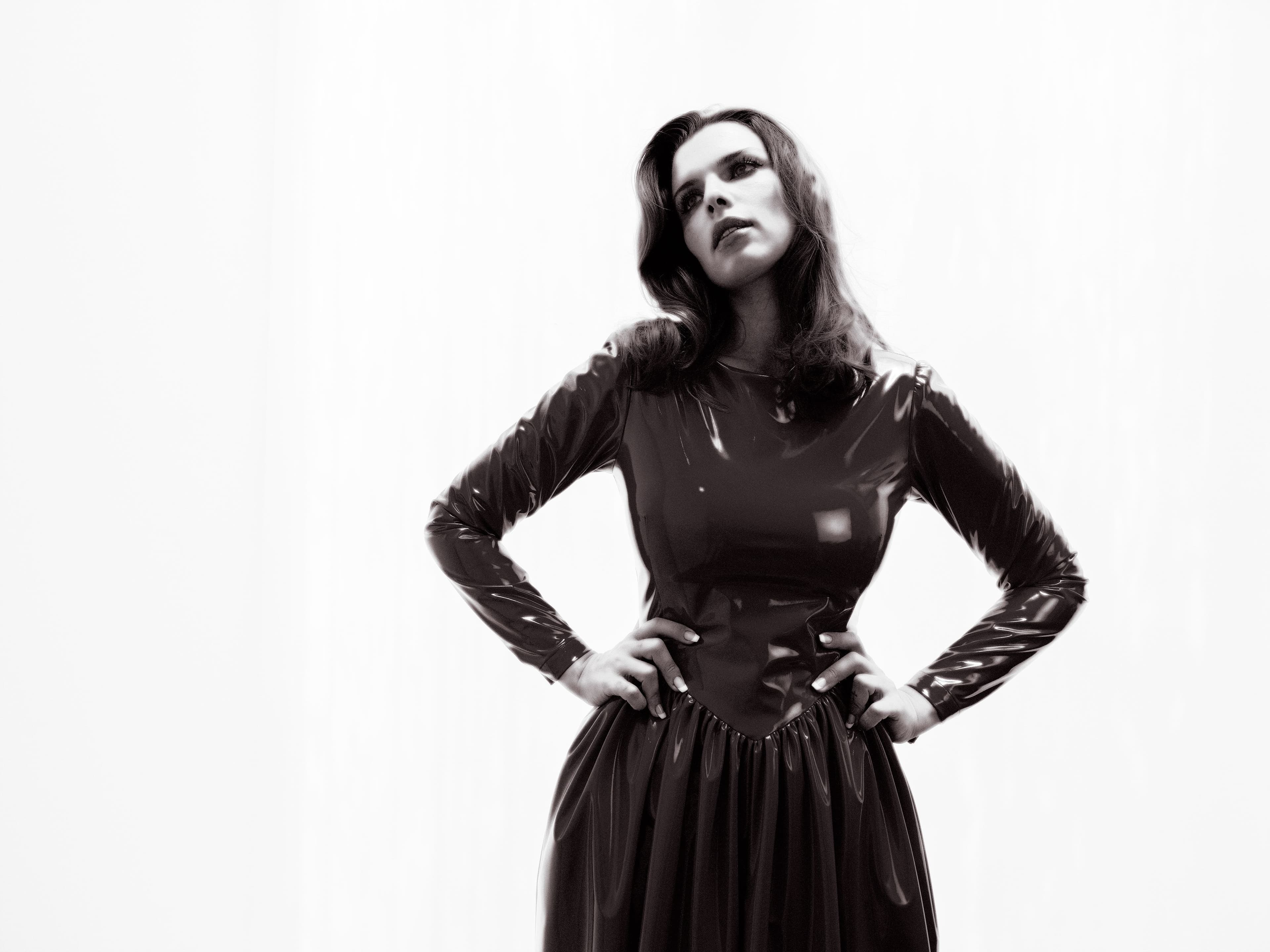
Dress by Batsheva
Julia Fox Does It All
At thirty-one, Julia Fox has lived more lives than most people may ever know or reveal. She was born in Italy and lived with her grandfather until age six, when she crossed the Atlantic to move in with her father and brother. As a child in Yorkville, Manhattan, with a parent who treated her like an adult, she was largely on her own, which is when the adventures began.
With her past as a seven-year-old poet, preteen shoplifter, fourteen-year-old club kid, brief runaway, New School dropout, and teenage dominatrix-turned-ice cream scooper, Fox is a master of self-creation. She was a downtown It Girl, a Playboy model, and a one-time club owner. She launched a minimal knitwear line, Franziska Fox, with her friend Briana Andalore at age twenty-three and sold her used underwear in Union Square as a teen. She traversed the Louisiana bayou and photographed the remnants of an abusive relationship. With the Safdie brothers’ 2019 film Uncut Gems, she wrote herself into her first film role. She knows how to hustle and how to open up. She also knows when to let others in. “When Steven Soderbergh asks you to be in a movie, you say yes,“ says the artist over Zoom from New York. “I said yes even before I read the script.“
Fox is talking about No Sudden Move, the esteemed director’s new Detroit period crime thriller starring Don Cheadle, Benicio Del Toro, Brendan Fraser, Jon Hamm, Frankie Shaw, and Fox. It’s an ensemble drama, racing with twists and turns, that follows Curt (Cheadle) and Ronald (Del Toro) as they join forces reluctantly for “one good job.“ Fox plays Ronald’s mistress Vanessa, who is abused, cheating and cheated on, and quietly waiting to make a move no one can see coming. “I love my character Vanessa,“ says Fox of the Fifties anti-vixen. “I love playing these types of women that people sleep on and then they come back in the third act really strong. It’s that surprise factor.“
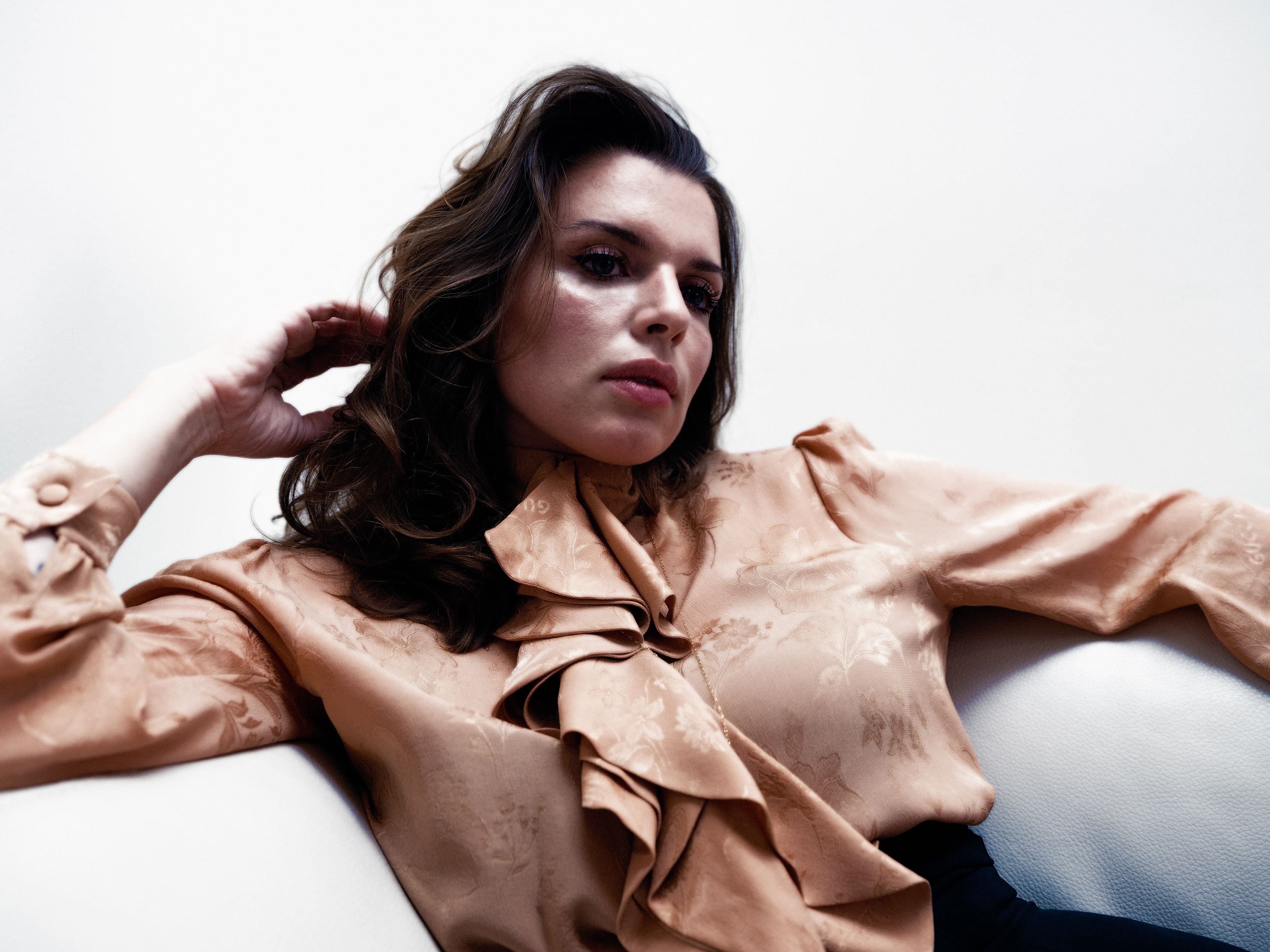
Shirt by Gucci. Skirt by Lafayette 148. Necklace by Monica Rich Kosann.
Fox is accustomed to surprises in her own life. Her move into acting wasn’t planned or expected. “Growing up, my dad always told me, you should be an actress, you should be an actress, and I just never saw it for myself,“ she reveals. “I just didn’t think that was possible for me.“
This changed, gradually, after she was introduced to Josh Safdie by a mutual friend at a restaurant in New York in 2012. Fox has a magnetism about her, a seductive aura combined with natural talent that, perhaps more than hustling, more than luck or timing, explains why she has had breakthrough success. When she met the Safdies, they had just begun working on the script for Uncut Gems. They immediately saw her as a muse, modeling the character who would become the girlfriend of Adam Sandler’s diamond dealer after her. The brothers called her every couple of years with new drafts, taking in her edits and concepts. A few years later, Fox tried out to play herself in the film. (Rumor has it she was up against Jennifer Lawrence and Scarlett Johansson—but who could inhabit her vulnerable, sexy hustler bravado better than herself?) The final product is easy proof of her richly intoxicating talent. “When the opportunity presented itself, it was kind of like destiny fulfilling itself,“ reflects Fox. “I can’t explain it, but I felt like, ’Wow, I’ve kind of always known low-key that I would’ve been really good at this if I had the self-esteem or the will to try it.’ If something is meant for you, it will happen for you.“
It was love at first performance. “I’ve really found my calling, but I definitely still want to keep up with my other really creative pursuits, as well,“ she explains.
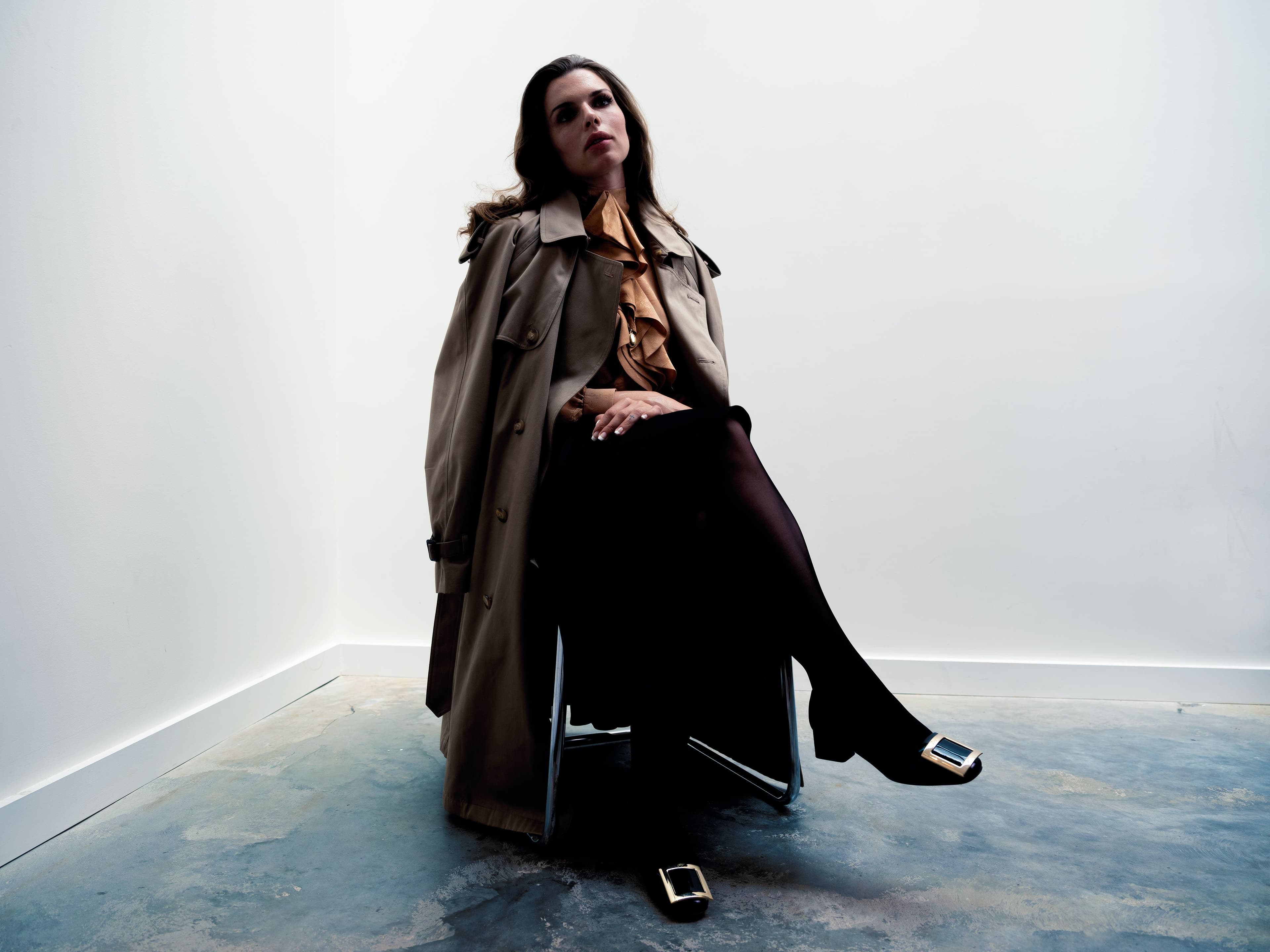
Trench coat, stylist’s own. Shirt by Gucci. Skirt by Lafayette 148. Hosiery by Wolford. Shoes by Roger Vivier. Necklace by Monica Rich Kosann.
These projects may be writing and directing work—like “Fantasy Girls,“ a short following teen prostitutes in Reno, Nevada, that she wrote while auditioning for Uncut Gems—producing, or activism fused with other artistic endeavors, such as her role as an outspoken advocate for police and prison reform, sex workers’ rights, and mental health. Her latest project is a memoir she just completed and will shop with her agent soon. “Some parts were really, really difficult to write and I think that’s what’s going to make it really good—that it was so just uncomfortable and having to go back there and re-write all these cringy, traumatic moments,“ she says. A new mom, Fox wrote every weekend from morning until night while her son’s grandparents spent time with him. “I’m just really diving in and I just kind of zone out,“ she adds. “I have to bring myself to a place where I’m so raw and so vulnerable and that usually happens after the fourth or fifth hour of writing. It’s when I kind of snap and then everything is on the table. Do I want people to know about this? Well, I have to go there, or else it won’t be sincere and it won’t be truthful and honest.“
Her openness underlies both her strong acting and the rare directness in her art, which includes not only writing, design, acting, and directing but also painting, photography, performance, and mixed media work. Her work is marked throughout by an emotional connectivity and a bluntness that stems from being unafraid of addressing experiences that are often shamed away from representation or examined with a voyeuristic or exoticized lens.
Perhaps this enduring rawness is clearest in Fox’s fine art. In her 2015 photobook Symptomatic of a relationship gone sour: Heartburn/Nausea, she chronicled three broken relationships and the violence within them through emotive, Nan Goldin-esque images and texts. PTSD, a second photography book from 2016, tells the story of her unrequited love for a gay male prostitute in Louisiana over six months. She shot herself in the haunting, isolated bayou, as well as the friends and acquaintances she came across—a warm-hearted prostitute named Pinky; a woman shooting up, track marks exposed; a boy with a bloody face, fresh from a punch.
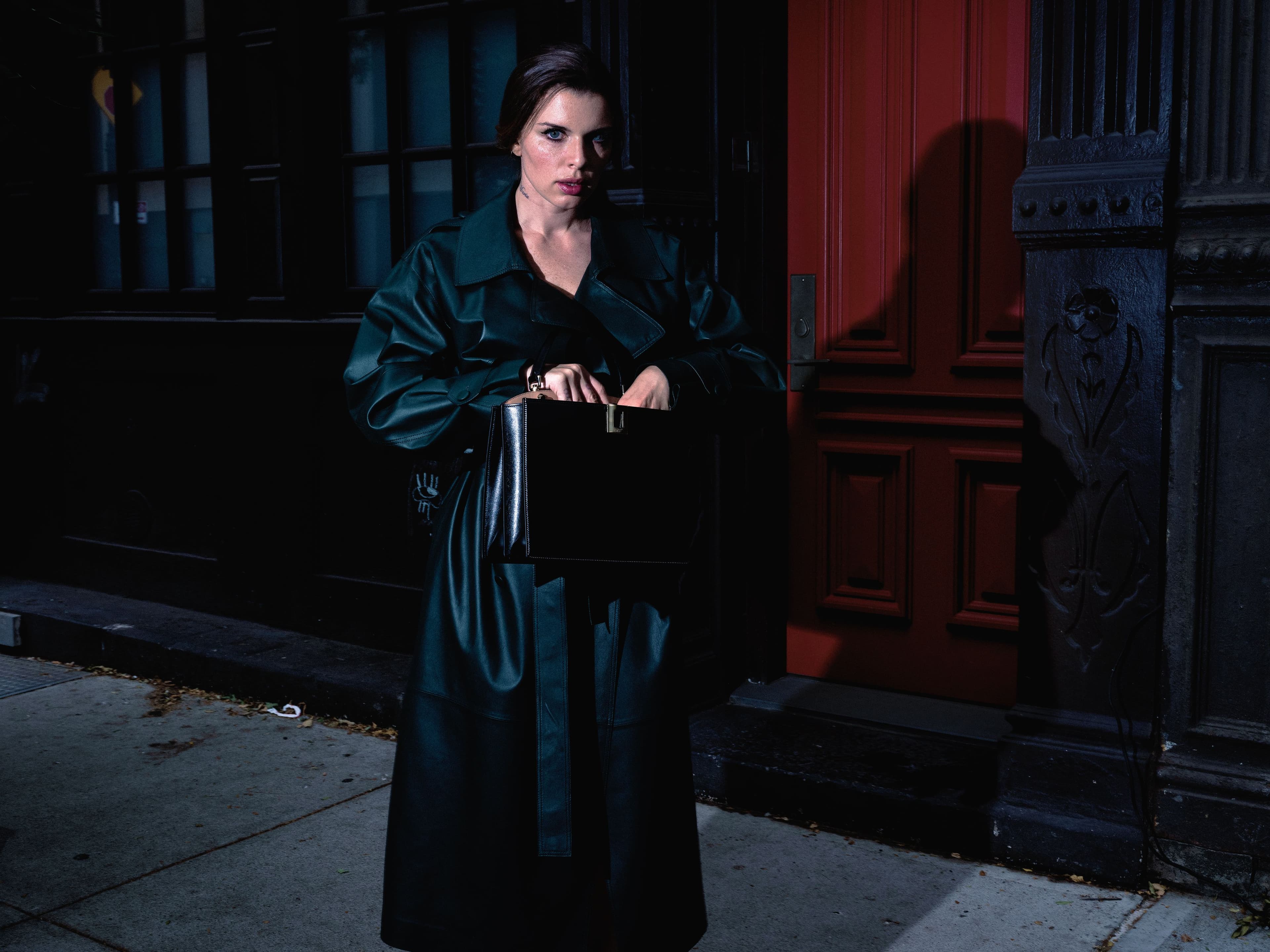
Trench coat by Lafayette 148. Bag by Roger Vivier.
Then there is “RIP Julia Fox,“ the Richie Shazam-curated art show she put on in New York in 2017 that featured paintings drawn in her own blood, depicting figurative nudes engaged in various forms of suicide. Ritual, sacrifice, BDSM, death, drugs, trauma, provocation, and survival—Fox gives it straight, whether she is speaking from her own experience or giving light to someone else’s. “I think the kind of stories I want to tell or help tell are just stories of more marginalized people, maybe people who need help telling their story or need a platform to tell their story on,“ she says.
Her inspiration comes both from her life and the people she finds connection with—a neighbor, a lover, or the woman Fox picked up hitchhiking who invited her home to the Navajo Nation and her brother, a medicine man who led them in an “excruciating and liberating“ peyote ceremony. “I really am just inspired by regular people, to be honest,“ says Fox. “I don’t know why that is. I’ve never walked in a museum and been inspired, but I’ve met people just on my travels around the world and then been inspired by their authenticity and their realness. I find people to just be so fascinating and incredible.“
As she continues to star in more high-profile films, more eyes will be on Fox. As a woman who has seen and experienced quite a lot, who is well aware of her own path, she seems unfazed. “I’ve literally been asked everything under the sun. I guess in this field I just want it to be believable and entertaining. That’s really all I want to do when it comes to acting. I hate shitty acting because it always throws me off, so I just hope I can really draw people into the story and keep them captivated and just make a good fucking movie,“ she says. “Making a movie is so different than any other type of art form because there are so many players involved. That is so different than anything I’ve done before. Because I was always like, ’No, I got this,’ never asking for help. To kind of relinquish control when you’re making a movie, that is exhilarating for me. You come and then do your part and then you have to leave, and then there are a thousand other actors doing it as well.“
Something tells us that even as one in a thousand, Fox will be seen.
No Sudden Move is now streaming on HBO Max. Read this story and many more in print by ordering our Summer 2021 issue here.
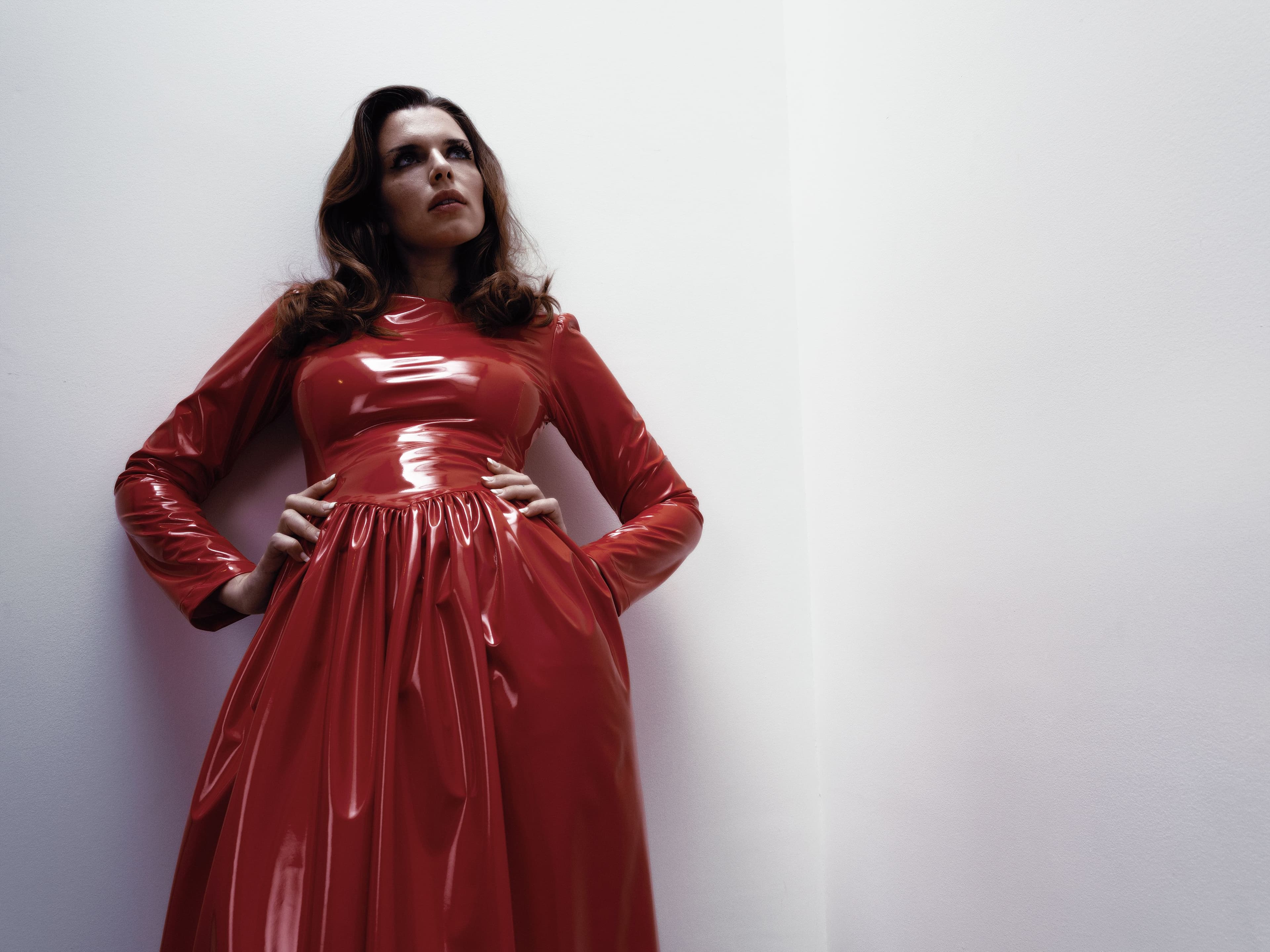
Dress by Batsheva
As a nonprofit arts and culture publication dedicated to educating, inspiring, and uplifting creatives, Cero Magazine depends on your donations to create stories like these. Please support our work here.






